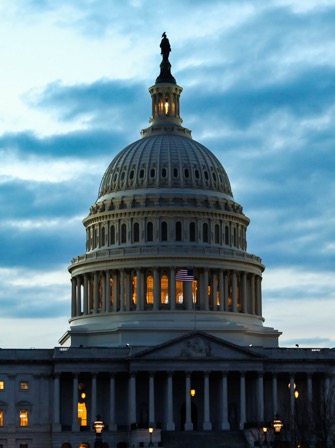 Patent reform is becoming an annual event in Washington, DC. This year the Innovation Act was reintroduced, without any change to a bill that passed the House by a wide margin in 2013 but went on to stall in the Senate due to the Supreme Court deciding two landmark cases that give district courts broad discretion to award attorneys fees in patent cases. After some thought that the bill would sail through the House of Representatives without even an additional hearing, there have been several hearings on the bill already and during the latest hearing multiple members of the Judiciary Committee suggested that the bill could be improved. See House Judiciary Questions PTO Director Michelle Lee on Innovation Act.
Patent reform is becoming an annual event in Washington, DC. This year the Innovation Act was reintroduced, without any change to a bill that passed the House by a wide margin in 2013 but went on to stall in the Senate due to the Supreme Court deciding two landmark cases that give district courts broad discretion to award attorneys fees in patent cases. After some thought that the bill would sail through the House of Representatives without even an additional hearing, there have been several hearings on the bill already and during the latest hearing multiple members of the Judiciary Committee suggested that the bill could be improved. See House Judiciary Questions PTO Director Michelle Lee on Innovation Act.
The Senate has also held several hearings on patent reform, with a competing view of what patent reform should look like being submitted by Senator Chris Coons in the form of the STRONG Patents Act. The House is also considering more tailored legislation narrowly focusing on demand letters (i.e., the TROL Act), and just recently Senators Tammy Baldwin (D-WI) and David Vitter (R-LA), along with United States Representatives Jim Sensenbrenner (R-WI) and John Conyers, Jr. (D-MI) submitted the Grace Period Restoration Act, which would reinstated the full 12 month grace period that was taken away from inventors as part of the America Invents Act (AIA).
Against this backdrop I will host a free webinar on Tuesday, April 21, 2015, 2pm ET (1pm CT) on the topic of patent reform. I will be joined by Chris Israel and Peter Harter, two people with decades of experience and knowledge on the inner workings of DC, how legislation gets done and specific and unique knowledge and insights relating to patent reform.
Israel is currently with American Continental Group, which is one of Washington’s premiere government affairs and strategic consulting firms. Prior to joining ACG he served in a number of senior level positions during the Bush Administration. Perhaps most significantly, he was appointed to be the first U.S. Coordinator for International Intellectual Property Enforcement by President Bush. In this role, he was responsible for coordinating and leveraging the resources of the U.S. government to protect American intellectual property at home and abroad.
Harter is currently with The Farrington Group, a consulting firm that provides advice on legislation, regulation, and technical standards, as well as lobbying services. His subject matter expertise is in technology law, policy and politics. Harter has previously served as head of global government affairs for Netscape, and he has lobbied on patent reform for Intellectual Ventures.
During this webinar we will talk about the various pending patent reform bills focusing, on the key provisions in each bill, what passage would mean to the patent system, the likelihood that they will pass, and the politics at play. In addition to taking as many questions as we can we will discuss the following:
- The Innovation Act, including fee-shifting, customer stays and heightened pleading requirements.
- The STRONG Patents Act, including changes to post grant administrative trials and damages.
- The TROL Act demand letter reforms with both the Innovation Act and STRONG Patents Act.
- The Grace Period Restoration Act, including whether elimination of the grace period was truly an unintended consequence of the AIA.
- Politics of patent reform, including the push by Constitutional Conservatives to raise patents as a property rights issue.
This should be an insightful and highly informational session for anyone interested in both the legislative reality and politics that will impact whether there is patent reform, and if so what it will look like. CLICK HERE to REGISTER for this free webinar.
To keep up to date with patent reform please see the articles below. You can also sign up for our daily e-mail newsletter.

![[IPWatchdog Logo]](https://ipwatchdog.com/wp-content/themes/IPWatchdog%20-%202023/assets/images/temp/logo-small@2x.png)

![[[Advertisement]]](https://ipwatchdog.com/wp-content/uploads/2024/04/Patent-Litigation-2024-banner-938x313-1.jpeg)


![[Advertisement]](https://ipwatchdog.com/wp-content/uploads/2024/04/UnitedLex-May-2-2024-sidebar-700x500-1.jpg)
![[Advertisement]](https://ipwatchdog.com/wp-content/uploads/2024/04/Artificial-Intelligence-2024-REPLAY-sidebar-700x500-corrected.jpg)
![[Advertisement]](https://ipwatchdog.com/wp-content/uploads/2024/04/Patent-Litigation-Masters-2024-sidebar-700x500-1.jpg)

![[Advertisement]](https://ipwatchdog.com/wp-content/uploads/2021/12/WEBINAR-336-x-280-px.png)
![[Advertisement]](https://ipwatchdog.com/wp-content/uploads/2021/12/2021-Patent-Practice-on-Demand-recorded-Feb-2021-336-x-280.jpg)
![[Advertisement]](https://ipwatchdog.com/wp-content/uploads/2021/12/Ad-4-The-Invent-Patent-System™.png)






Join the Discussion
2 comments so far.
Gene Quinn
April 16, 2015 01:56 pmMichael-
I wish I could agree with your conclusion. I wonder though whether government has been manipulated really. Maybe that is the case. I would like to think that is the case, but I think at least some fundamentally oppose a property rights based system and ideologically feel that patents are unnecessary and actually stifle innovation (despite all the evidence to the contrary). So believing they are being manipulated would at least hold out hope that they are not intentionally causing all this damage. I do suspect that many have their hearts and minds in the right place, but will politics allow them to do the right thing?
A lot of complicated issues. But you are certainly right that over time patent rights have eroded in a methodical way, which is troubling indeed.
You may find these articles interesting:
https://ipwatchdog.com/2013/12/29/patent-erosion-2013-what-would-the-founding-fathers-think/id=47119/
https://ipwatchdog.com/2014/08/28/erosion-of-patent-rights-will-harm-us-economy/id=50136/
https://ipwatchdog.com/2014/12/10/toxic-asset-the-gradual-demise-of-the-american-patent/id=52571/
https://ipwatchdog.com/2014/10/01/dark-days-ahead-the-patent-pendulum/id=51475/
-Gene
Michael
April 16, 2015 11:15 amGene,
I was an elected official for eight years in my local government. During that time, I witnessed firsthand how powerful interests manipulate government for their gain at the expense of all other constituencies. These interests were organized and acted according to a well-crafted plan implemented over years. Each step in the plan was designed so that the endgame was difficult to identify and easy to deny. Opponents were labeled conspiracy “nuts” or worse. So this brings me to the ongoing reforms to the US patent system.
First, there was KSR v. Teleflex which fundamentally changed how the United States views innovation. After KSR, only revolutionary inventions are patentable. Anything less than revolutionary is obvious when either examined by the USPTO or litigated before a court.
Next, there was Alice and other related decisions which fundamentally changed how the United States views patentable subject material. After Alice and others, even revolutionary inventions are no longer patentable.
Then, there was the AIA which fundamentally changed how the United States views the certainty of the patents granted by the USPTO. After the AIA, the predictability afforded by the property rights embodied in a patent evaporated.
Now, other reforms before Congress which will fundamentally change how the United States views the enforcement of patent rights. After these reforms, enforcement will be risky and when unsuccessful the consequences to the patent holder will be punitive.
Now that all pieces to the puzzle are nearly in place, it is clear that the government has been manipulated once again to allow implementation of another well-crafted plan detrimental to the interests of so many.